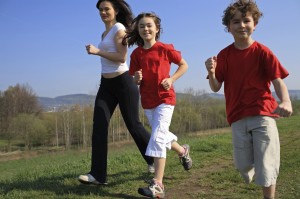We know that adults can improve their concentration and help guard against memory loss as they age, when they get regular exercise. Similarly, a new study found that kids may gain cognitive benefits from being physically fit, as well.
Researchers at the University of Illinois found that children who are in better physical shape tend to have better language skills than their lesser fit peers. The brains of the fitter kids responded faster and more strongly during reading, which translated into better reading performance and comprehension.
Fitness was measured by the rate of oxygen uptake during exercise. Researchers pointed out that their study did not prove that being physically fit has a direct effect on the electrical activity in kids’ brains; the study’s lead author added that there could be a third variable that affects both fitness and language processing. But it adds to the evidence that physical fitness leads to improved cognitive performance in some measures of brain function.
The study used electrodes to measure brain activity, focusing on brain waves associated with word recognition and grammar. The fitter kids’ brains showed stronger responses — that is, more activity — when reading normal or nonsensical sentences than the brains of the children who were less fit.
The study was published recently in the journal Brain and Cognition.
Previous studies had found that regular aerobic activity is associated with improvements, of varying degrees, in children’s cognition, academic achievement, behavior and social functioning.
Researchers have found that regular aerobic exercise produces positive structural changes in children’s brains, including the development of new neurons and new blood vessels, increased volume in the hippocampus (a structure inside the brain involved in long-term-memory storage), and better connectivity among different parts of the brain (source: Centers for Disease Control and Prevention).
Animal and human studies have shown that regular aerobic exercise also increases blood volume, fat mobilization and the body’s ability to regulate its own temperature. Regular aerobic exercise has also been found to help build children’s self-esteem and reduce depression (in youths, as well as adults).
In addition to the possibilities of improving a child’s cognitive function, cardiovascular health and even the way that he or she relates to others, regular physical activity constitutes an important way to help address the global obesity epidemic in children.
A healthy diet and regular exercise are both key to keeping many kids at healthy weights; more than one-third of school-age children in the United States are now overweight or obese, yet studies have found that in many developed countries, including the U.S., only a small percentage of children as a whole (around 20 percent) take part in moderate to vigorous physical daily activity.
By Lisa Pecos

Leave a Reply